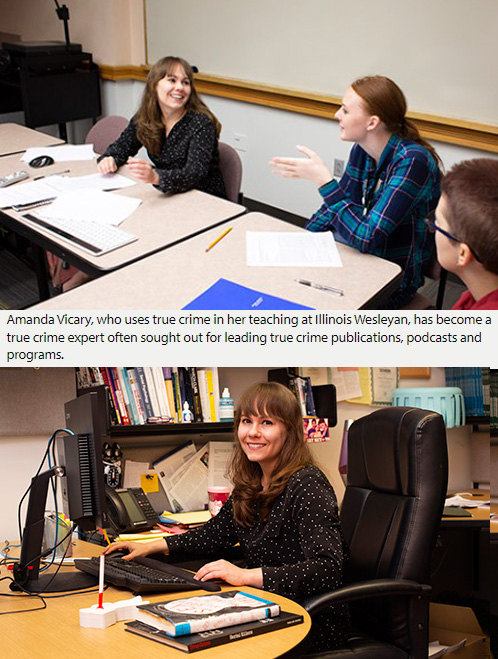2024 March 18 NEWS ARTICLE – Illinois Wesleyan professor’s class educates students about local Barton McNeil murder conviction
March 18th, 2024 | By Paul J. Aguilar

An Illinois Wesleyan professor has decided to utilize the locally-famous Barton McNeil murder conviction in order to teach a psychology class about the criminal justice system.
Professor Amanda Vicary teaches a small class of seventeen students, most of them avid students of criminology, psychology and sociology. The class is Psych 359: Crime and the Justice System: A Social Psychology Perspective.
“Her specialty is suspect convictions and it’s been awesome,” said Illinois Wesleyan senior psychology major and humanities/criminology minor Jane Mai of the class.
In 1999, Barton McNeil was given a life-sentence for the murder of his three-year-old daughter, Christina, but he has always plead innocent, insisting that it was his ex-girlfriend who had killed his daughter.
McNeil’s ex-girlfriend is Misook Nowlin-Wang, who was imprisoned for murdering her mother-in-law, Linda Tyda, a decade following the death of Christina McNeil.
Ever since the murder of Linda Tyda, Barton McNeil’s case has reopened to explore the possibility that Nowlin-Wang is the true guilty party.
“Bart’s case is kind of woven in throughout the whole semester,” Professor Vicary said. “There isn’t really one specific day where we discuss only his case.”
Prof. Vicary’s class capitalizes on interacting with Barton McNeil in prison directly via phone conversations in order to get direct answers and in-depth interaction between him and the students.
A phone call between Barton McNeil and Professor Vicary and her students took place in her class last Thursday.
After one student asked if Christina could have died from natural causes, McNeil said that no, she likely couldn’t have died naturally because the ground floor bedroom window had been tampered with, proving that someone had broken into the house.
Another student asked about Barton McNeil’s thoughts on the results of his most recent evidentiary hearing.
“I feel very much the same; we knew this was coming,” McNeil answered. “He [Judge Yoder] has denied my evidence in every stage up until now. He has denied all this recent evidence, including all the Tyda murder stuff. This is the kind of stuff the judge would never allow in the courtroom during a trial, so he granted us a hearing based on that evidence knowing that at the end, he would dismiss it.”
Another student asked about McNeil’s ex-wife Tita, also Christina’s mother, wondering what her thoughts were on the case’s development.
“Back during my trial, and ever since the Tyda murder, she would not speak to anybody,” McNeil said. “Many reporters have tried to contact her. Last we heard, she packed up and moved out of the state to avoid having to answer any questions about the case. Today, if she’s reading any of these newspapers, I don’t know how she could possibly believe that I’m guilty.”
Professor Vicary asked the last question, which was if Barton McNeil had any memories of Illinois Wesleyan University and his old home on N. Prairie St. According to McNeil, the house is no longer there, but one of his fondest memories was learning how to ride a bike on that block as a child.
After the students’ questions were answered, Professor Vicary drew a chart on the classroom’s whiteboard in order to help the class to keep track of the key figures in the case.
A podcast on WGLT entitled Suspect Convictions, hosted by Scott Reeder, serves as one the primary reference points for the class.
“I can tell from your podcast notes that some of you are getting names and dates mixed up,” Professor Vicary said. “There are about three families involved.”
Students shared their thoughts about the class and the case as it currently stands.
“I want to see Bart [McNeil] get freed,” Mai later said. “Maybe I’m biased because the first thing we did was talk to Bart, and it’s hard to be unbiased when you hear a guy so passionate about his case. I do want to see more evidence get brought up.”
“It’s very interesting because I’m actually from Vietnam and now I’m in the middle of this local murder case,” Mai continued. “You don’t hear about stuff like this back where I’m from.”
Through learning the timeline, Illinois Wesleyan senior sociology major Rosie Abraham realized that her mother had worked with Tita McNeil in the past.
“She worked at BroMenn hospital,” Abraham said. “I don’t think she knew a ton, but she met Tita McNeil when she worked at the hospital in 2012. Tita had a button of Christina’s face that she wore everyday still, and she said Tita didn’t talk about it a lot. Another nurse told her about it and said that Tita was a fragile person, but I think that by that she meant that she had been through a lot in her life.”
Illinois Wesleyan senior psychology major and criminology minor Haven Ryburn has been studying the case for four years.
“I feel like the situation deserves reevaluation, so I think it would be really nice to see some of the appeals reevaluated and the evidence looked at in a different way,” Ryburn said. “I really enjoy the classes that have been provided. The first class I took was the justice scholars class, an intro writing class. That’s where we learned to read research papers and that’s where we learned about his [McNeil’s] case and others in town.”
“It turned my interest in true crime from a fun thing to an academic thing,” Ryburn continued. “I took a follow-up class and I’ve done some internships having to do with other cases in town. It’s great to look at other things happening in our area.”
Illinois Wesleyan senior sociology major and film minor Samson Mosley spoke about the complexities he notices about the case.
“I feel like there are a lot of moving parts and it seems very, very complex,” Mosley said. “But I feel there is a lot of evidence that points to Misook as the perpetrator of the crime because her most recent conviction is very incriminating. There’s a lot of information out there and it can feel convoluted at times. I’d like to find out more about what happened on that day—the day Christina died—and I’d like clarity.”
“I think it’s great,” Samson said about the class. “It’s a lot of information to present, but Professor Vicary handles it well. I like the format because we read articles and we listen to podcasts, so it’s diverse, which keeps it engaging.”
Earlier this month, a lengthy Esquire magazine article about the case was released, which has received much attention already. The article will serve as another reference point for Professor Vicary’s class in the future.
The following is an additional link to another article about Amanda Vicary as published in Illinois Wesleyan University IWU Magazine.




